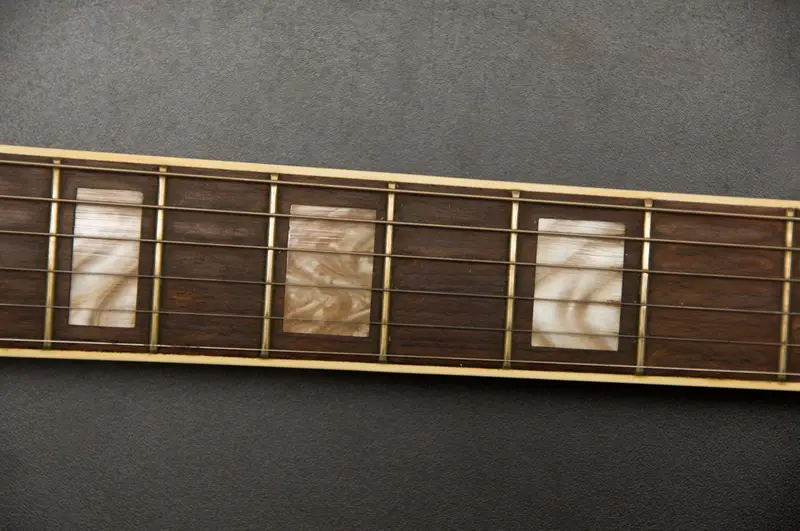The strings on your guitar are the most important element in the tone your guitar creates. Keeping your guitar strings clean is crucial to preserving the tone you get from new strings as long as possible. And a routine cleaning regime is key to keeping your guitar strings clean.
You should be cleaning your guitar strings before and after you play your guitar, every time. Keep a clean cloth with your guitar and take eight seconds to wipe the strings down, to remove dust and dander that has settled on them before you play. Then quickly wipe the strings down again when you are done playing to remove sweat, skin, sebum (oils), saliva, snot, and anything else you might have had on your hands.
This quick routine will exponentially extend the life of your strings, saving you time and money and helping your strings preserve the tone you expect.
Should I Be Cleaning My Guitar Strings?
 Yes! Absolutely, you should be cleaning your guitar strings. And frequently, at that.
Yes! Absolutely, you should be cleaning your guitar strings. And frequently, at that.
Most musicians choose their brand, gauge, and type of strings based on trial and error over many years. When a guitarist finally settles on a specific brand, it’s typically because they are pleased with the tone that it generates from a specific instrument and the guitarist’s specific needs at that time in their musical journey. Most of us don’t have the resources to put a new pair of strings on our guitars every time we play them and therefore we need to do everything in our power to preserve that new string tone for as long as possible.
Tone can be bright, warm, muddy and anywhere in between on the spectrum. Most of that tone is affected by the type (flat or round wound), materials (bronze, nickel, etc), gauge (light to heavy), quality (bulk bin, Elixir) and age of the strings. Anytime you change your strings, you get a sudden reminder of how much your tone changes as the strings age.
The best way to preserve your strings and maximize their life and tone is to remove standing debris before it gets ground into the string windings and to remove moisture and other debris before it dries. That is why it is so important to have a before and after playing string cleaning routine that you follow religiously.
What do I need for basic cleaning of my guitar strings?
- A clean flannel, cotton, or micro-fiber cloth
- About 8 seconds, give or take
 You can use just about any old piece of clean cloth. Choose a fabric that will not leave lint or fibers on the strings. You just need something clean and dry to wipe the dust, grime and fluids from the strings before and after you play.
You can use just about any old piece of clean cloth. Choose a fabric that will not leave lint or fibers on the strings. You just need something clean and dry to wipe the dust, grime and fluids from the strings before and after you play.
- Start by tucking a clean, dry cloth under the strings near the bridge.
- Pinch both sides of the cloth and slide it up to the nut.
- Fold the cloth over so it sandwiches the strings.
- Wipe down to the bridge.
- Repeat a few times until you are satisfied the strings are clean and dry.
Many players will keep a cloth on their mic or guitar stands and wipe their strings down between every song. There are many variants that will determine how often you will want to do basic cleaning of your strings. Some of the variants are environment (humidity or aridity), playing style (sweat much?), smoke tar / vape residue and hand washing are just a few. Ultimately, you have to decide for yourself but at the bare minimum you should wipe your string before and after playing.
What happens if I don’t clean my guitar strings?
Debris, tarnish, and time are the three variants that have the most impact on the tone of new strings. When you aren’t playing your guitar, it collects dust just like any piece of furniture in your home. This dust is mostly composed of discarded skin cells, otherwise known as dander. Each human in your house sheds about 30,000 – 40,000 skin cells per hour! And then there’s the 40,000 or so tons of space dust that the Earth picks up each year. On top of that, you can add dander from pets, pollen from the air, smoke/ash/tar/residue from cigarettes or vape, and even oils from cooking. These all light upon your guitar’s strings while it is stationary and if it isn’t removed before you start playing some of it gets forced into the windings of the strings. Over time, this debris builds up and is detrimental to tone.
Further, while you are playing your guitar, your body naturally does some pretty gross things. Your skin oozes oils, the strings abrade your calluses and fingernails, and your hands might sweat. But it doesn’t stop there. Oh no, sir! You eat spicy chicken wings, wipe your nose, scratch your ears, spill beer, and high-five the bass player who didn’t wash their hands after using the can. Inevitably, microns of sebum, skin, fromunda, sweat, spit, feculence, MSG and ranch dressing amalgamate on your strings into a single disgusting organism that I like to call “gack”. Cleaning a thick layer of gack off of someone’s strings and fretboard is easily my least favorite thing about being a luthier (guitar maker). I think Jimmi might have had second thoughts about playing with his teeth had he known about this. If you aren’t one to wash your hands frequently, doing so will also help keep your strings cleaner. Sebum, romunda and Feculence isn’t just a great band name – it’s on your hands, so clean it off before you play your guitar.
This gack gets worked into the string windings and as it builds up it prevents the strings from vibrating uniformly over their entire length affecting the strings’ ability to resonate, as well as causing inconsistent tones. This process happens slowly and isn’t noticeable from day-to-day. It’s a process called accretion – the opposite of erosion. When you change your strings you essentially get a snapshot comparison of how your old guitar strings sounded versus how it sounds with clean, new strings.
In addition to the build up of debris on your strings, tarnish is another factor to contend with. Tarnish is the residue that remains as the metal in your strings reacts to oxygen and moisture. Tarnish has the same damaging effect on tone that debris buildup on the strings has. It also can exacerbate the issue by trapping debris in the tarnish residue making it more difficult to remove. A string cleaning routine helps prevent tarnish by removing moisture and every time you wipe the strings you polish them ever so slightly.
There are many other factors besides cleanliness that contribute to the degradation of your strings’ tone including playing style and time. However, string cleanliness is the factor over which you have the most control.
Will isopropyl alcohol clean tarnish off of my guitar strings?
 Isopropyl alcohol on a cloth and soaking strings in isopropyl alcohol will not remove tarnish. I’ve tried simply pouring isopropyl alcohol on a cloth and vigorously rubbing strings to remove tarnish, to virtually no avail. I’ve also tried soaking the strings in alcohol for up to 15 mins then rubbing with a cloth and have again only seen minor improvements. In my opinion, what little improvement I witnessed would likely have been accomplished by simply rubbing with a dry cloth. Ultimately, retarding the growth of tarnish with daily cleaning is the best way to keep tarnish at bay for as long as possible.
Isopropyl alcohol on a cloth and soaking strings in isopropyl alcohol will not remove tarnish. I’ve tried simply pouring isopropyl alcohol on a cloth and vigorously rubbing strings to remove tarnish, to virtually no avail. I’ve also tried soaking the strings in alcohol for up to 15 mins then rubbing with a cloth and have again only seen minor improvements. In my opinion, what little improvement I witnessed would likely have been accomplished by simply rubbing with a dry cloth. Ultimately, retarding the growth of tarnish with daily cleaning is the best way to keep tarnish at bay for as long as possible.
There are many products that can be used to clean strings if one so chooses. From simple household products like isopropyl alcohol, boiling water and WD-40, to specialized products made specifically for cleaning guitars strings. Most products not intended specifically for cleaning guitar strings carry unwanted consequences that can include damaging the wood on your fretboard, breaking down the finish on your guitar, and even exacerbating the degradation of strings by attracting and trapping debris. I have found that a simple routine of religiously wiping your guitar strings before and after playing is the least expensive and most beneficial step that can be taken to extend the life and tone of your guitar strings. Not only is this method free, you’ll also save money on cleaners and you won’t have to change your strings nearly as often.


